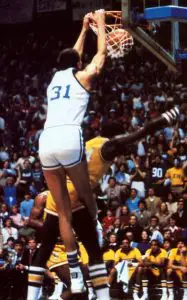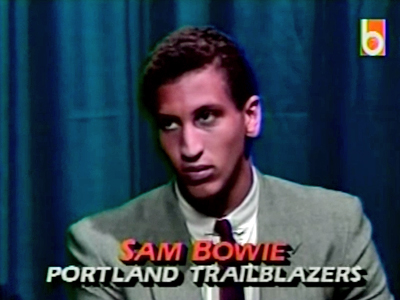When thinking of the biggest busts in NBA history, who are the first names that come to mind?
If you’re a fan of the New School, you probably thought of someone like Anthony Bennett or maybe even Markelle Fultz (although it’s obviously still early).
Maybe you thought of Darko Milicic, or perhaps even “The Kandy Man” Michael Olowokandi and his disappearing act with the L.A. Clippers.
And then, there’s Sam Bowie.
Mention his name and 9 times out of 10, you’ll hear the word “bust” attached to it, and then that will most likely be the end of the conversation.
But Bowie, who led Kentucky to the 1984 Final Four before being taken by Portland, should be seen not as a failure but as an example for any pro athlete in dealing with adversity to follow.
You won’t hear this from any casual NBA fan who takes their sound bytes from the Facebook comments section, but Bowie’s career was far more productive than you’ve been led to believe, and his heart and determination made him a player worth remembering.

Sam Bowie: The “Bust” That Never Was
Bowie, a college star at Kentucky, of course had the unenviable task of being drafted just prior to a player you may have heard of: a guy by the name of Michael Jeffrey Jordan.
He also went the same year as a superstar counterpart at the same position, Patrick Ewing (the #1 pick in 1985; Bowie went #2).
But Bowie should be held to a different standard than these two legends of the game.
He battled injuries throughout his basketball career, and while he lost athleticism and confidence like quicksand dripping through an hourglass with each passing year, he kept bouncing back from them, time after time.
Granted, he wasn’t the correct pick by Blazers at the time. No sane person could argue that.
But considering all that he overcame and how productive he was over the course of his career, he doesn’t deserve to be called a “bust” — not by a long shot.
If you haven’t seen ESPN’s 30 for 30 episode on Bowie yet, carve out 20 minutes of your day and watch this sometime:
Sam Bowie Was No Star, But His Career Should Be Respected
The aforementioned “Human Victory Cigar” Darko Milicic. Stromile Swift. Derrick Williams.
These are just a few names who comprise the list of recent #2 overall picks, and none of them came close to matching the production of Bowie, whose name is still widely regarded as arguably a more common punchline among fans.
Unlike many other so-called “busts,” Bowie battled his entire career.
Following his second year in the NBA and an All-Rookie First Team season, he broke his left tibia and was carried off the court in a game vs. the Milwaukee Bucks after being tangled up with teammate Jerome Kersey.
“I firmly believe I can be one of the top centers in the league if I’m healthy,” Bowie said afterward. “One year, things are going to fall into place, and I’m going to show people how good I can be.”
He started to make good on that promise in his third season. Bowie averaged 16 ppg, 2 blocks, and nearly 7 rebounds a game for the ’86-’87 Blazers, who finished just a hair shy of 50 wins on the season while gelling as a future contender.
Despite the promise he showed as a Blazer, his injuries limited his effectiveness.
His scoring average hovered in the 13-15 point range for three years for the New Jersey Nets, but he was never quite the same and his shooting percentages plummeted.
“I have one huge regret,” Bowie said. “I wish I would’ve been more patient and didn’t come back as quickly as I did the second year I fractured my leg. You feel like you disappointed Portland. You’re getting paid a lot of money and you can’t play. I don’t know if it’s guilt or regret. But I’ve never been one to say, ‘Why me?’
Bowie suffered three broken legs over the course of his career and still managed to fine-tune his game in each comeback attempt, averaging 10.9 points per game, 7.5 rebounds, 2.1 assists and nearly 2 blocks per game (1.8 to be exact) during his ten-year career in the NBA.
At the end of the day, Bowie was a victim of pressure and expectations more than anything else.
But then shouldn’t diminish what he accomplished in the league, and he deserves more respect than simply being dismissed as a bust.
Instead, Bowie should be remembered along these lines: as a successful NBA player, a fighter and a guy who cared about more about his team than his own personal health, rather than a punchline to a joke or an answer to the same tired, old Michael Jordan trivia questions.
Check out his career highlight reel below if you get a chance, and get a glimpse of just how good he could have been:
